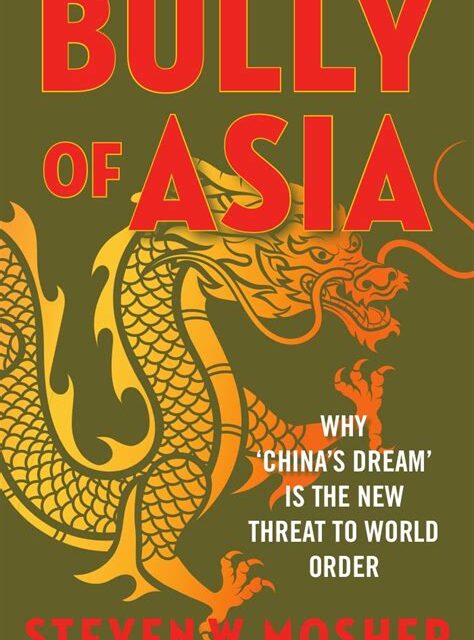Steve Mosher’s Bully of Asia: Why China’s Dream is the New Threat to World Order is a wake-up call of China’s plan for world dominance, providing a sober warning of what’s to come if “the once and future hegemon” is allowed to achieve its goal.
While much of the world is fixed on nuclear threats from North Korea, Mosher instructs that it is not Pyongyang but Beijing that should have our attention.
The question of global security aside, Mosher’s warning fully understood also underscores part of the cause for alarm over the specter of a deal between China and the Catholic Church for control of the Church there.
China’s current resolve to dominate and assimilate other nations is a replay of its past, Mosher contends, as is its brutal repression of its own people and its hostility toward any society that constitutes a challenge – real or perceived – to its presumed superiority.
He gives a comprehensive recounting of China’s five-thousand-year history framed with informed observations to illustrate the current threat its regime presents.
It is China that invented totalitarianism thousands of years ago, Mosher explains, and it is China which holds that its race and culture are superior, affording it deference from all others.
And he details how, for the communist Chinese regime, the U.S. is its primary obstacle to global economic, political, military and informational dominance.
China teaches its people to hate America for standing in its way, he says, and publishes maps that show the specific degree to which it could exact nuclear destruction on the United States.
Mosher, a social scientist, author, speaker and president of the Population Research Institute, is an eminent international authority on China and population issues. Bully of Asia (Regnery Publishing, 2017) is his latest of several books on China.
His direct experience dates back decades to when he was the first American social scientist to visit mainland China.
As a graduate student visiting in 1979 at the invitation of the Chinese government he was given access to government documents. In this capacity, Mosher also witnessed firsthand China’s brutal forced abortion practice in carrying out its then-new one-child policy.
Mosher was a pro-choice atheist going into the experience, and it caused him to re-examine these principles. It also thus opened the door to his work since that time fighting coercive population control programs and eventually led to him becoming a pro-life Catholic.
With China’s past unfolded in the book and a glimpse given into the psyche of the regime — in short, a lethal dose of arrogance laced with bitterness and contempt toward others, including its own subjects, which is passed off as backhanded humility — Mosher details specifics of China’s current efforts to dominate in varied avenues.
This includes marked military build-up – that which is supported by the Chinese Communist Party and therefore not subject to depletion depending on who’s in power, along with strikingly successful cyberespionage over the last 15 years that has depleted America’s lead in military technology significantly.
It’s also meant a purposefully accelerating economy some think is close to overtaking the U.S., one achieved at the expense of its residents’ welfare and their very lives; currency manipulation; aggressive acquisition of land and resources globally; and economic punishment of foreign companies operating within its borders should it be determined their governments are guilty of transgressions toward China.
It’s entailed China targeting its populace with ongoing pervasive anti-American propaganda as well, and an expanding international media outreach for communicating its “message.”
Of particular note are the Confucius Institutes popping up around the world on campus at colleges, universities and secondary schools.
Presented as education in China’s language, history, and culture, Mosher says they are propaganda outposts, funded by the Chinese government, which also provides their teachers and curriculum. Schools on the receiving end of the Institutes agree to provide office space in exchange for funding, and the Chinese government retains academic control over the program.
Mosher says the purpose of these outposts is to sanitize China’s brutal image, validate its global power grab, and in some instances, it would also result in intelligence gathering at America’s universities. China’s communist regime actually has disdain for Confucius’ principles, explains Mosher, but its leaders believe the ancient Chinese philosopher provides a good propaganda tool outside the country’s borders.
The naïve expectation of engagement with the People’s Republic of China is wishful thinking, according to Mosher, and it’s has blinded the U.S. to the danger facing the world if China’s ambitions are left unchecked.
He concludes up with specific suggestions to counter the rising threat of the Chinese party-state and preserve a world order that recognizes the rule of law and universally recognized human rights.
Americans must come to recognize Beijing’s routine and ruthless persecution of its own citizens, he says. Further, China’s aggressive rhetoric and acts overall – detailed in the book – cannot be ignored for the purpose of preserving financial or academic interests.
North Korea’s rogue acts can only be stopped by calling out its primary ally – China, says Mosher, which has encouraged and enabled North Korea’s action of late.
The U.S. must also upgrade its alliance with Taiwan, Mosher says, a key effort in neutralizing China’s global advance. Taiwan’s geographic location is key to countering China in the Pacific Rim, he adds. But perhaps more importantly, the island nation having thrived as a modern democratic state is a symbol of hope for those, who would dissent from China’s rule, whether its own dissidents or neighboring states.
Mosher offers a somber warning and an informed resource in navigating the danger posed by China’s would-be dominance in the Bully of Asia.
America has roughly a decade to respond to the Bully of Asia, he concludes, after that, it will be too late.















Excellent review. I strongly suggest that after reading this excellent review, everyone reading TCR should 1) get & read Steve’s book and 2) check out the website of Theresa Marie Moreau: https://www.theresamariemoreau.com. She has written extensively on the underground Catholic Church in China. Her books and articles are essential reading for everyone – from high school students to seasoned diplomats.
Most of all, share this review and Theresa’s website with everyone you know.
Our Lady, Queen of China, pray to God for Cardinal Zen and the underground Catholic Church in China!
Lisa Bourne,thank you for your blog post.Really thank you! Awesome.